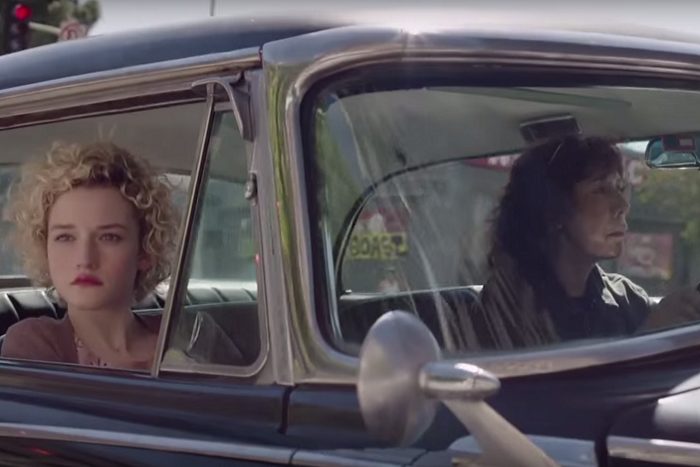‘Grandma’ Tells a Candid Abortion Story, But It’s a Privileged One
The movie should be lauded for its frank dialogue about choice and abortion.

Grandma is a movie with two storylines, and thankfully, the one that’s so seldom told in mainstream—or any, really—cinema is the one that gets more screen time: A young woman gets pregnant and has an abortion with the support of her family, while the discussion surrounding it is frank (even if NPR’s description of the film wasn’t), but not alarmist.
Before we get there, though, we’re introduced to the girl’s titular grandmother Elle (played by Lily Tomlin), a nearly broke poet-slash-academic whose longtime partner passed away, in the midst of a breakup with her much-younger girlfriend, Olivia (Judy Greer). Elle’s got a nasty side—“You were just a footnote,” she snarls at the tearful Olivia—but also a hidden, fragile one: She unceremoniously gives her partner the boot, but afterward breaks down in the shower.
Soon, Elle gets a knock on her door: It’s her teenage granddaughter, Sage (Julia Garner), cutting to the chase. She’s made an appointment and needs cash, fast. “I’m pregnant and I want an abortion,” she says. “Is that terrible?”
Says Elle: “Well, it’s nothing to dance a jig about.”
Elle’s unquestioning support of her granddaughter, though, is touching to witness. She has no cash to help fund Sage’s $600 procedure since she cut up her credit cards to make an anti-capitalist statement. But, she tells Sage, “We’re gonna deal with this.” Elle knows of another clinic where “they help women for free.”
In an unmistakable nod to the fight to keep alive resources for women to gain safe, legal abortion care, when the pair arrive at the clinic, it’s long gone and repurposed.
They closed the clinic to put up a coffee shop.
Thus begins their cash grab visits to Elle’s friends and associates. Sage’s wealthy, workaholic mom, Judy (Marcia Gay Harden), could help, but Sage is terrified of going to her.
To be sure, the movie should be lauded for its frank dialogue about choice and abortion. Sage calmly talks through her decision not to have a child, Elle yells at an abortion protester that a baby doesn’t have fingernails until 22 weeks, and a doctor’s office scene features specific terms like “D and E” and “vacuum aspiration.” The use of real medical terms is of particular importance; too often, language in media surrounding abortion is deceptive, with no basis in science and medicine. The film’s use of accurate terminology helps de-stigmatize a procedure so many films portray as horrifying, dangerous, or even deadly.
But there’s one point that unravels the central conflict in Grandma: Sage always had a backup plan. She could (and does) ask her mom for the money, and her mom ultimately ends up paying for the procedure.
Not only does that weaken the whole “money-motivated race against the clock” narrative, but it throws into sharp relief the abortion stories not being told here: of women who can’t afford an abortion under any circumstances and don’t have access to clinics that can help them; of those who don’t have the support of their family or loved ones; of women who already have children who seek abortions; or of those whose circumstances lead them into procuring risky procedures. Elle is among them—she tells Sage of her own abortion, done in a basement by someone who “said he was a medical student.”
That isn’t Sage’s story, but hers is an honest, sometimes painful one worth telling. This isn’t an easy decision for her, and Elle assures Sage it’s one she “will think about, at some moment, every day for the rest of your life.”
After Sage has the abortion (with both Elle and Sage’s mother by her side, the two reconciling after years of not speaking, of course), Grandma bounces back to the less profound plot: Elle reconciling with her ex-girlfriend Olivia and seemingly unearthing a more loving part of herself, of course. It’s sweet, and Lily Tomlin makes any role sing, but it’s a story that’s been told before.
But Sage’s? These sorts of stories haven’t been told nearly as much (with some exceptions). That story should be celebrated.
We have to listen, though, for the real stories of women out there who aren’t as privileged as Sage. We shouldn’t need a Hollywood movie for them to be heard.
